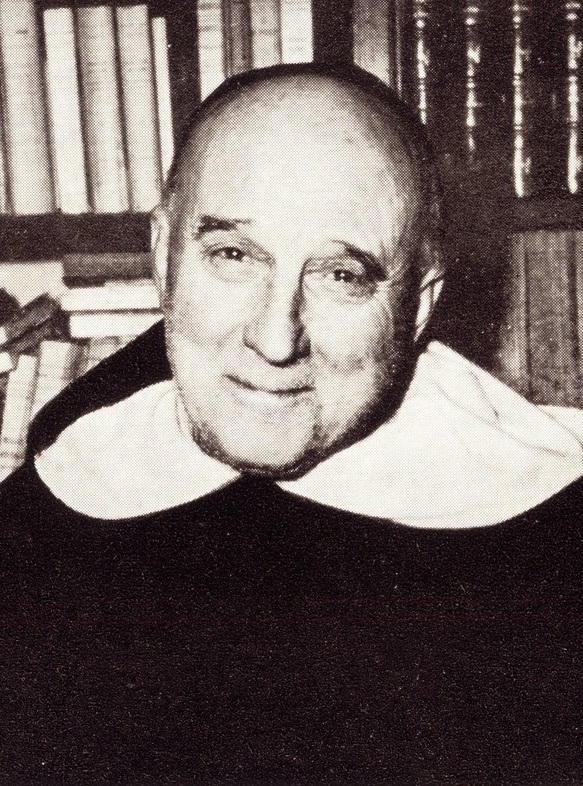From Matins of the Feast of St. Peter Celestine, Pope and Confessor
Source: Roman Breviary (1911), www.breviary.net| Lesson iv | |
 | |
| Petrus, a nómine quo Póntifex est appellátus, Cælestínus dictus, honéstis catholicísque paréntibus Æsérniæ in Samnítibus natus, adolescéntiam vix ingréssus, ut ánimum a mundi illécebris custodíret, in solitúdinem secéssit. Ibi contemplatiónibus mentem nútriens, corpus in servitútem rédigens, férream caténam ad nudam carnem adhibébat. Congregatiónem, quæ póstea, Cælestinórum dicta est, sub régula sancti Benedícti instítuit. Hinc, quasi lucérna supra candelábrum pósita, cum abscóndi nequíret, (Romána Ecclésia diu viduáta pastóre) in Petri Cáthedram ignórans et absens adscítus, magna novitátis admiratióne non minus quam repentíno gáudio cunctos affécit. Cum autem in pontificátus sublimitáte collocátus, váriis disténtus curis, assuétis incúmbere meditatiónibus vix posse cognósceret, óneri páriter et honóri voluntárie cessit. Indeque priscam vitæ ratiónem répetens, obdormívit in Dómino, ejúsque pretiósam mortem crux præfúlgens in áëre ante cubículi óstium réddidit ámplius gloriósam. Miráculis multis tam vivens quam post óbitum cláruit ; quibus rite examinátis, Clemens quintus anno postquam decéssit undécimo, eum Sanctórum número adscrípsit. | Peter, who is called Peter Celestine, because when he became Pope he did so under the title of Celestine V, was the son of respectable Catholic parents, and was born at Isernia in Apulia. He was hardly entered on boyhood, when he withdrew into a desert, in order to keep his soul safe from the snares of the world. In solitude he fed his mind with heavenly meditation, and brought his body into subjection, even by wearing an iron chain next to his bare flesh. He founded, under the Rule of St. Benedict, that congregation which was afterwards known as the Celestines. His light, as of a candle set upon a candlestick, could not be kept hidden, and after the Church of Rome had for a long while been widowed of a shepherd, he was chosen without his knowledge and in his absence, to fill the chair of Peter. The news of his election filled himself with as great amazement, as it did all others with sudden joy. When, however, he was seated in the exalted place of the Papal dignity, he found that the many cares by which he was beset made it wellnigh impossible for him to give himself to his accustomed meditations ; of his own free will, he resigned the burden and the honour together ; and, while he sought to return to his old way of life, he fell asleep in the Lord. How precious his death was in his sight was gloriously manifested by a Cross which appeared shining in the air before the door of the cell. He was illustrious for miracles both during his life and after his death, and when these had been duly investigated, Clement V, in the eleventh year after his departure hence, enrolled his name among those of the Saints. |
| V. Tu autem, Dómine, miserére nobis. R. Deo grátias. | V. But thou, O Lord, have mercy upon us. R. Thanks be to God. |
 | |
| R. Invéni David servum meum, óleo sancto meo unxi eum : * Manus enim mea auxiliábitur ei, allelúja. V. Nihil profíciet inimícus in eo, et fílius iniquitátis non nocébit ei. R. Manus enim mea auxiliábitur ei, allelúja. | R. I have found David my servant, with my holy oil have I anointed him. * My hand shall hold him fast, alleluia. V. The enemy shall not be able to do him violence ; the son of wickedness shall not hurt him. R. My hand shall hold him fast, alleluia. |
| | |
| V. Jube domne, (Dómine) benedícere. | V. Vouchsafe, Reverend Father (O Lord), thy blessing. |
| Benedíctio 5: Christus perpétuæ det nobis gáudia vitæ. R. Amen. | Benediction 5: May Christ bestow upon us the joys of life eternal. R. Amen. |
| Lesson v | |
 | |
| Ex libro Moralium sancti Gregórii Papæ | From the Book of Moral Reflections by St. Gregory the Pope |
| Lib. 10, cap. 16, in c. 12, Job | |
| Deridétur justi simplícitas. Hujus mundi sapiéntia est : cor machinatiónibus tégere, sensum verbis veláre : quæ falsa sunt, vera osténdere ; quæ vera sunt, falsa demonstráre. Hæc nimírum prudéntia usu a juvénibus scitur, hæc a púeris prétio díscitur : hanc qui sciunt, céteros despiciéndo supérbiunt : hanc qui nésciunt, subjécti et tímidi in áliis mirántur ; quia ab eis hæc éadem duplicitátis iníquitas, nómine palliáta, dilígitur, dum mentis pervérsitas urbánitas vocátur. Hæc sibi obsequéntibus præcépit honórum cúlmina quærere, adépta temporális glóriæ vanitáte gaudére, irrogáta ab áliis mala multiplícius réddere : cum vires súppetunt, nullis resisténtibus cédere ; cum virtútis possibílitas deest, quidquid explére per malítiam non valent, hoc in pacífica bonitáte simuláre. | The simplicity of the righteous is made a subject of derision. The wisdom of this world hideth our true feelings by artifice, and useth language to conceal our thoughts ; this is the wisdom which demonstrateth the truth of falsehood, and sheweth the falsehood of the truth. This kind of shrewdness the young acquire by practice, and children pay for the learning it. Those who are good at this look down upon their neighbours ; those who are bad at it are humble and timid, and wonder at it in others ; they regard this astuteness too, wrong though it be, with wistful admiration, under softened epithets. Unstraightforwardness is called good breeding. The principles of the world teach those who entertain them, to try and rise to distinction, and when they have attained the bubble of glory which is so soon to pass away, to feel it sweet to have at their feet them on whom they may wreak rich revenge. These principles teach a man, as long as he is strong enough, to try and attain his objects by cunning if we cannot get it by coercion. |
| V. Tu autem, Dómine, miserére nobis. R. Deo grátias. | V. But thou, O Lord, have mercy upon us. R. Thanks be to God. |
 | |
| R. Pósui adjutórium super poténtem, et exaltávi eléctum de plebe mea : * Manus enim mea auxiliábitur ei, allelúja. V. Invéni David servum meum, óleo sancto meo unxi eum. R. Manus enim mea auxiliábitur ei, allelúja. | R. I have laid help upon one that is mighty, I have exalted one chosen out of the people. * My hand shall hold him fast, alleluia. V. I have found David, my servant, with my holy oil have I anointed him. R. My hand shall hold him fast, alleluia. |
| | |
| V. Jube domne, (Dómine) benedícere. | V. Vouchsafe, Reverend Father (O Lord), thy blessing. |
| Benedíctio 6: Ignem sui amóris accéndat Deus in córdibus nostris. R. Amen. | Benediction 6: May God enkindle in our hearts the fire of his holy love. R. Amen. |
| Lesson vi | |
 | |
| At contra, sapiéntia justórum est : nil per ostensiónem fíngere, sensum verbis aperíre, vera ut sunt dilígere, falsa devitáre ; bona gratis exhibére, mala libéntius toleráre quam fácere ; nullam injúriæ ultiónem quærere, pro veritáte contuméliam lucrum putáre. Sed hæc justórum simplícitas deridétur ; quia ab hujus mundi sapiéntibus puritátis virtus fatúitas créditur. Omne enim quod innocénter ágitur, ab eis procul dúbio stultum putátur ; et quidquid in ópere véritas ápprobat, carnáli sapiéntiæ fátuum sonat. Quid namque stúltius vidétur mundo quam mentem verbis osténdere, nil cállida machinatióne simuláre, nullas injúriis contumélias réddere, pro maledicéntibus oráre, paupertátem quærere, posséssa relínquere, rapiénti non resístere, percutiénti álteram maxíllam præbére? | The wisdom of the righteous man is the contrary of all this. They seek to avoid deception, to give their thoughts a clear expression in their words, to love the truth because it is the truth, to avoid falsehood, and rather to suffer than to inflict evil. Such are they who seek not to avenge themselves for wrong, and deem it gain to be despised for the truth's sake. This their simplicity is made a subject of derision, for such as are wise in this world believe the purity of their virtue to be simple foolery. Whatsoever is done innocently, they consider without doubt stupid. Such works as the truth approveth are idiotic, when tried by carnal standards of wisdom. After all, what stupider thing is there in this world than to express our real thoughts in our words, to keep nothing quiet by skilful tact, to repay no injuries, to pray for them which curse us, to seek poverty, to give up property, to strive not with such as take from us, to turn the other cheek to the smiter? |
| V. Tu autem, Dómine, miserére nobis. R. Deo grátias. | V. But thou, O Lord, have mercy upon us. R. Thanks be to God. |
| R. Iste est, qui ante Deum magnas virtútes operátus est, et omnis terra doctrína ejus repléta est : * Ipse intercédat pro peccátis ómnium populórum, allelúja. V. Iste est, qui contémpsit vitam mundi, et pervénit ad cæléstia regna. R. Ipse intercédat pro peccátis ómnium populórum, allelúja. V. Glória Patri, et Fílio, et Spirítui Sancto. R. Ipse intercédat pro peccátis ómnium populórum, allelúja. | R. This is he who wrought mighty deeds and valiant in the sight of God, and all the earth is filled with his doctrine: * May his intercession avail for the sins of all the people, alleluia. V. He was a man who despised the life of the world and attained unto the kingdom of heaven. R. May his intercession avail for the sins of all the people, alleluia. V. Glory be to the Father, and to the Son, and to the Holy Ghost. R. May his intercession avail for the sins of all the people, alleluia. |








No comments:
Post a Comment